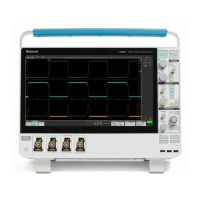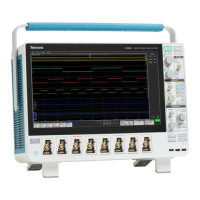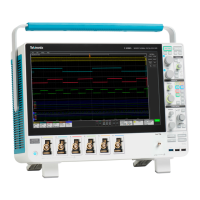Commands listed in alphabetical order
TRIGGER:A:BUS
:B1:CAN:FD:ESIBIT?
might return NOCARE, indicating that
CANFDpacketsarenotbeingfiltered based o n the ESI bit value.
TRIGger:{A|B}:BUS:B<x>:CAN:FRAMEtype
This command sets the frame type (data, remote, error or overload) to be used
when triggering on a CAN bus signal. The trigger condition must be set to
FRAMEtype (using TRIGger:{A|B}:BUS:B<x>:CAN:CONDition).
B<x> is the
bus number.The bus number is specified by <x>.
Conditions
Requires the SR-AUTO Triggering and Analysis application.
Group
Trigger
Syntax
TRIGger:{A|B}:BUS:B<x>:CAN :FRAMEtype
{DATa|REMote|ERRor|OVERLoa d}
TRIGger:{A|B}:BUS:B<x>:CAN :FRAMEtype?
Arguments
DATa specifiesadataframetype.
REMote specifiesaremoteframetype.
ERRor specifies an error frame type.
OVERLoad specifies an overload frame type.
Examples
TRIGGER:A:BUS:B1:CAN:FRAME TYPE DATA sets the CAN trigger frame type
to DATA.
TRIGGER:A:BUS:B1:CAN:FRAME TYPE? might return
:TRIGGER:A:BUS:B1:CAN:FRAM ETYPE DATA indicating the frame type is data.
TRIGger:{A|B}:BUS:B<x>:CAN:IDentifier:MODe
This command sets the addressing mode (standard or extended format) to be
used when triggering on a CAN bus signal. The trigger c ondition must be set to
IDANDDATA or DATa (using TRIGger:{A|B}:BUS:B<x>:CAN:CONDition).
The bus number is speci fi ed by <x>.
Conditions
Requires the SR-AUTO Triggering and Analysis application.
Group
Trigger
MSO54, MSO56, MSO58, MSO58LP Programmer 2-777

